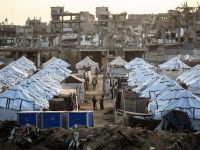Arab foreign ministers recommended on Saturday that political contacts with the Israeli government should be suspended until Israel stopped its military assaults against the Palestinians.
"(We recommend) calling off all Arab political contacts with the Israeli government as long as the aggression and blockade against the Palestinian people and their national authority continues," a statement from the ministers said, quoted by Reuters.
If Arab countries adopt the call, Egypt and Jordan -- the only two to have signed peace treaties with the Jewish state -- would be the most affected, said the agency. They have launched a peace initiative which includes a ceasefire, an Israeli withdrawal to previous troop positions, implementation of old interim agreements and resumption of talks on a permanent agreement.
The Arab foreign ministers stopped short, however, of calling for an outright break in diplomatic ties with Israel.
The handful of other Arab countries which created low-level ties after the 1993 Oslo interim peace accords have already frozen them.
"Political contacts are being made under the barrel of an Israeli gun, then we talk about peace, this is totally unacceptable," Arab League Secretary General Amr Moussa told reporters after the one-day meeting in Cairo.
The ministers called for the freezing of Israeli settlement building and expansion, an international boycott of goods produced in settlements, as well as an emergency meeting of the UN General Assembly or Security Council to provide protection for Palestinian civilians.
INTERNATIONAL RESPONSIBILITY
"I believe it is the responsibility of the international community to protect the civilian population from the bombardment of fighter (jets), tanks and rockets...otherwise the whole international system will be a joke," Moussa said.
The UN Security Council on Thursday put off a decision on the latest Palestinian appeal for UN protection for Palestinian civilians, saying action could harm diplomatic efforts to end Middle East violence and revive peace talks.
The ministers recommended the immediate provision of diplomatic and financial assistance to the Palestinians under the auspices of the League's chief, as well as public appeals for funds.
An Arab summit in October pledged $1 billion dollars in aid to the Palestinians but little of it has yet emerged.
"The consensus in this morning's meeting was that our (Arab) credibility hung in the balance, and what is required is not only to defend our credibility but to defend our identity," Moussa said earlier in an open session attended by the 10 foreign ministers and Palestinian President Yasser Arafat.
Moussa, echoing popular Arab sentiment that the world had washed its hands of the Palestinians, earlier vowed that Arab governments would do more to support their Palestinian brethren.
The ministerial meeting recommended high level diplomatic consultations with the United States and the international community to highlight the dangers of the situation.
Arab leaders condemned the Israeli air strikes and called for international intervention to stem the violence.
"Using F-16s is (an act of) war, and this is unacceptable," Egypt's new Foreign Minister Ahmed Maher told reporters before entering the morning session.
"What we need is for Israel to cease its aggressive and provocative acts," he said.
MOUSSA: ARABS COMMITTED TO PEACE, BUT NOT TO ‘ISRAELI PEACE’
Secretary General of the Arab League Amr Moussa said on Saturday that the Arabs are still committed to peace, “ but not the Israeli peace,” accusing the Jewish state of escalating its attacks on the Palestinian so that they and the other Arab parties involved in the peace process succumb to the Israeli conditions.
Meanwhile, Palestinian President Yasser Arafat said that Israel’s use of excessive forces against the Palestinians aims at destroying the peace process.
The urgent meeting was called for by Arafat following Israel’s attacks on Friday and early Saturday – Albawaba.com
© 2001 Al Bawaba (www.albawaba.com)







